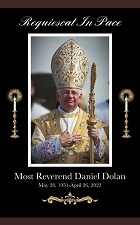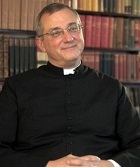Objection No 1: The Papacy came first, not after the priesthood. When Christ said to Peter. "Thou art Peter and upon this rock I will build My Church...." He instituted the Papacy.
Response: These words of Our Lord Jesus Christ, addressed to Peter, contain a promise to take certain actions in the future: “I will build My Church” and “I will give to thee the keys”.
Between the promise (expressing intention to do in the future) and the fulfillment of the promise (a real action) Jesus Christ instituted His Priesthood at the Last Supper.
The chronological order of the events according to the Gospel is following:
- Our Lord Jesus Christ promised to build His Church upon Peter and to give him the keys of the kingdom of heaven (St. Matthew 16:18-19),
- A day before His death on the Cross, at the Last Supper, Our Lord instituted the Apostles priests, while Peter did not yet receive the supreme jurisdiction over them (St. Luke 22:19; 1 Cor. 11:24),
- Between Resurrection and Ascension, Jesus Christ fulfilled His promise and gave to Peter the supreme jurisdiction over whole Church Militant (St. John 16: 15-17).
The teaching of THE COUNCIL OF TRENT:
On the Institution of the Most Holy Sacrifice of the Mass.
He delivered (His own body and blood) to be received by His Apostles, whom He then constituted priests of the New Testament; and by those words, “Do this in commemoration of me” He commanded them and their successors in the priesthood to offer (them); even as the Catholic Church has always understood and taught (can. ii)
Canon II. If anyone saith that by those words, "Do this for the commemoration of Me," 20 Christ did not institute the Apostles priests; or did not ordain that they and other priests should offer His own body and blood; let him be anathema.
20 1 Cor. xi, 24 ; Luke xxii. 19. (1)
The Vatican Council distinguishes between the promise (“promised”) and the fulfillment of the promise (“given”):
On the Institution of the Apostolic Primacy in Blessed Peter
WE therefore teach and declare that, according to the testimony of the Gospel, the primacy of jurisdiction over the universal Church of God was immediately and directly promised and given to Blessed Peter the Apostle by Christ the Lord. For it was to Simon alone, to whom He had already said: "Thou shalt be called Cephas," (John I, 42) that the Lord, after the confession made by him, saying, "Thou art the Christ, the Son of the living God," addressed these solemn words, "Blessed art thou, Simon, Bar-Jona, because flesh and blood have not revealed it to thee, but My Father, who is in heaven. And I say to thee that thou art Peter, and upon this rock I will build My Church; and the gates of hell shall not prevail against it. And I will give to thee the keys of the kingdom of heaven. And whatsoever thou shalt bind upon earth, it shall be bound also in heaven; and whatsoever thou shalt loose on earth, it shall be loosed also in heaven." (Matthew xvi, 16, 19) And it was upon Simon alone that Jesus after His resurrection bestowed the jurisdiction of Chief Pastor and Ruler over all His fold in the words, "Feed My lambs, feed My sheep." (John xxi, 15, 17) (2)
A CATHOLIC DICTIONARY:
Once more before his Passion Christ made a promise to Peter which brought the strength he was to have for his future office, and by virtue of Christ's help, into sharp contrast with his sin and frailty as a man. He was to deny his Master three times, but this denial was not to involve the loss of faith or to deprive him of his supernatural strength as the future rock of the Church.
After the resurrection Christ graciously allowed St. Peter to atone for his threefold denial by a threefold declaration of love, and again, under a new metaphor, Christ committed to him the fulness of jurisdiction. Christ was, and ever is, the Good Shepherd, but in a few days his visible presence was to be withdrawn, and on earth Peter was to be chief shepherd of Christ's flock. "Feed my lambs.'' "Be the shepherd of my sheep" (perhaps "little sheep," probatia). "Feed my sheep" (perhaps probatia again). The Church was still Christ's flock ("my lambs," "my sheep"), but Peter is entrusted by Christ with the office of feeding both the old and the little ones of the flock. The duty of feeding the young and "the watchful care and rule over maturer Christians'' (Westcott, ad loc.) are alike laid upon him. The gift of the Holy Ghost, the power of remitting and retaining sins, are bestowed on the other Apostles as well as upon. St. Peter. But Peter alone receives the keys of the Church; he alone is the rock on which the Church is built; on the faith of him alone the faith even of the other Apostles depends; he alone is made the shepherd of the whole flock. This primacy of Peter after Christ's ascension clearly manifests itself even in the scanty records of the New Testament, though it must not be forgotten that the personal inspiration of the other Apostles and the fact that they were free to extend their missionary conquests throughout the earth made their relation to Peter very different from that between the Pope and bishops of later times.(3)
So, according to the testimony of The Gospel, The Council of Trent, The Vatican Council, etc., when Jesus Christ said to Simon Bar-Jona "Feed My lambs (the faithful), feed My sheep (the pastors)," giving him a true and proper primacy of jurisdiction over other Apostles, the Priesthood already was instituted.
A Catholic priest
References:
The quotes from the Holy Scripture taken from: THE HOLY BIBLE PUBLISHED WITH THE APPROBATION OF THE CATHOLIC ARCHBISHOPS AND BISHOPS OF IRELAND. The Douay Version of the Old Testament of 1609, and with the Rhemish Version of the New Testament of 1582, Given at Dublin, May 4th, 1857.
(1) DOGMATIC CANONS AND DECREES
AUTHORIZED TRANSLATIONS OF THE DOGMATIC DECREES OF
THE COUNCIL OF TRENT, THE DECREE ON THE IMMACULATE
CONCEPTION, THE SYLLABUS OF POPE PIUS IX, AND
THE DECREES OF THE VATICAN COUNCIL
BY THE DEVIN-ADAIR COMPANY
Nihil Obstat. REMIGIUS LAFORT, D.D., Censor
Imprimatur. +JOHN CARDINAL FARLEY, Archbishop of New York
June 22, 1912
THE DOGMATIC DECREES OF THE COUNCIL OF TRENT
On Baptism. p. 63.
On the Institution of the Most Holy Sacrifice of the Mass p.132-134.
ON THE SACRIFICE OF THE MASS, p.143
(2) THE DECREES OF THE VATICAN COUNCIL
Edited WITH AN INTRODUCTION
by the REV. VINCENT McNABB, O.P.
NEW YORK, CINCINNATI, CHICAGO
BENZIGER BROTHERS Printers to the Holy Apostolic See 1907
Imprimi potest FR LAURENTIUS SHAPCOTE, O.P., S.T.L. Prior Provincialis
Imprimi potest + GULIELMUS Episcopus Arindelensis Virarius Generalis
Westmonasteril die 19 Oct. 1906
First Dogmatic Constitution on the Church of Christ. pp. 36-39
(3) A CATHOLIC DICTIONARY
CONTAINING SOME ACCOUNT OF THE
DOCTRINE, DISCIPLINE, RITES, CEREMONIES,
COUNCILS, AND RELIGIOUS ORDERS OF
THE CATHOLIC CHURCH
BY WILLIAM E. ADDIS
SECULAR PRIEST : SOMETIME FELLOW OP THE ROYAL UNIVERSITY OF IRELAND
AND THOMAS ARNOLD, M.A.
FELLOW OF THE SAME UNIVERSITY
SIXTH EDITION, WITH ADDITIONS.
NEW YORK
THE CATHOLIC PUBLICATION SOCIETY CO.
9 BARCLAY STREET
1887
NlHIL OBSTAT: EDUARDUS S. KEOGH, CONG. ORAT., CENSOR DEPUTATUS
IMPRIMATUR: HENRICUS EDUARDUS, CARD. ARCHIEP. WESTMONAST. Die 18 Dec., 1883.
IMPRIMATUR: JOHN CARD. McCLOSKEY, ARCHBISHOP OF NEW YORK. Feb. 14, 1884.
JURISDICTION
p. 669
|

